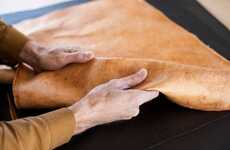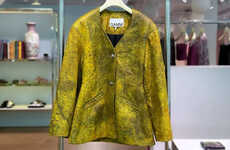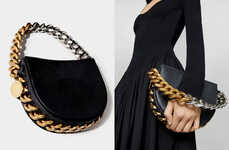
These Leather Products Use Designer Alexander McQueen's DNA
Riley von Niessen — July 14, 2016 — Pop Culture
References: behance.net & dezeen
Tina Gorjanc created a series of human leather products that make use of famed fashion designer Alexander McQueen's DNA.
The 'Pure Human' project comments on the "protection of biological information" and aims to debate the "current legal structures" that surround it. Tina Gorjanc was able to manufacture human leather for the project based off the DNA of designer Alexander McQueen by extracting some of his genetic material and "implementing it into a cell culture." With this, she makes jackets, backpacks and accessories from an eerie skin-toned material that's complete with added freckles and other natural-looking variations.
Tina Gorjanc explains the project by saying that if she was able to patent extractions of Alexander McQueen's DNA without any law preventing her, "we can only imagine what big corporations with bigger funding are going to be capable of doing in the future."
The 'Pure Human' project comments on the "protection of biological information" and aims to debate the "current legal structures" that surround it. Tina Gorjanc was able to manufacture human leather for the project based off the DNA of designer Alexander McQueen by extracting some of his genetic material and "implementing it into a cell culture." With this, she makes jackets, backpacks and accessories from an eerie skin-toned material that's complete with added freckles and other natural-looking variations.
Tina Gorjanc explains the project by saying that if she was able to patent extractions of Alexander McQueen's DNA without any law preventing her, "we can only imagine what big corporations with bigger funding are going to be capable of doing in the future."
Trend Themes
1. Biofabricated Materials - The use of DNA to create leather products opens up opportunities for biofabricated materials in various industries.
2. Legal and Ethical Debates - The critical discussion surrounding the protection of biological information and current legal structures presents disruptive innovation opportunities in the field of ethics and law.
3. Personalized Designer DNA - The concept of using a designer's DNA to create customized fashion items highlights the potential for personalized designer DNA products in the fashion industry.
Industry Implications
1. Fashion - The use of designer DNA in creating unique leather products presents disruptive innovation opportunities within the fashion industry.
2. Biotechnology - The production of human leather products through cell culture and genetic material extraction opens up possibilities for innovative applications in the biotechnology industry.
3. Law - The critical discussion on legal structures and the protection of biological information creates opportunities for disruptive innovation in the field of law and intellectual property rights.
5.7
Score
Popularity
Activity
Freshness























